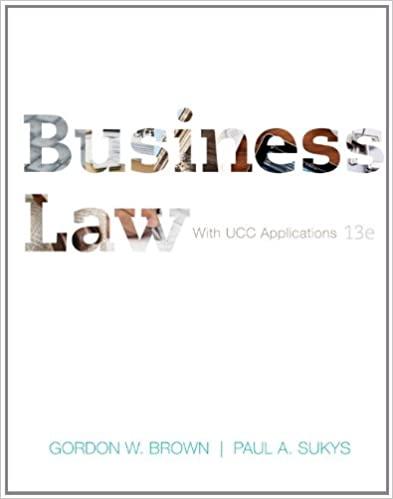Question
Then write an answer applying Smith to the problem in the Peterson case which follows Smith. In an action for negligence, is David's father liable
Then write an answer applying Smith to the problem in the Peterson case which follows Smith. In an action for negligence, is David's father liable for injuries to Phil? Peterson would be litigated in the same jurisdiction as Allen. Smith U. Allen d. Judith Smith alleges that James Allen owned a golf club which he left lying on the ground in the backyard of his home. On April 12, 2015, his son, the eleven-year-old co-defendant Jimmy Allen, was playing in the yard with the plaintiff, Judith Smith, age nine years. Jimmy picked up the golf club and proceeded to swing at a stone lying on the ground. In swinging the golf club, Jimmy caused the club to strike the plaintiff about the jaw and chin. Smith alleges that Jimmy Allen was negligent since he failed to warn her of his intention to swing the club and he swung the club when he knew she was in a position of danger. Smith also alleges that James Allen was negligent and that he is liable for his son's actions. She alleges that although Allen knew the golf club was on the ground in his backyard and that his child would play with it, and that although he knew or "should have known" that the negligent use of the golf club by children would cause injury to a child, he neglected to remove the golf club from the backyard or to caution Jimmy against the use of the golf club. James Allen demurred, challenging the sufficiency of the complaint to state a cause of action or to support a judgment against him. The demurrer is sustained. A person has a duty to protect others against unreasonable risks. A person who breaches this duty is negligent and liable for injuries resulting from his negligence. No person, however, can be expected to guard against harm from events that are not reasonably to be anticipated at all, or are so unlikely to occur that the risk, although recognizable, would commonly be disregarded. A golf club is not so obviously and intrinsically dangerous that it is negligence to leave it lying on the ground in the yard. Unlike - knife, for example, it is not commonly used as a weapon. Thus, the father cannot be held liable on the allegations of this complaint.?
Aarons v. Peterson David Peterson stored a tool chest on the floor in the basement of his suburban home. In it he kept three screwdrivers, two wrenches, a hammer and several boxes of nails. Last Tuesday afternoon, his eleven-year-old son, David, Jr., and a nine-year-old neighbor, Phil Aarons, were playing knock hockey in the basement. Their were so strenuous they knocked the side rail loose from the baseboard. Phil, who was losing, was glad. He was tired of playing knock hockey and wanted to play with David's trains. David, however, wanted to continue the match. Spotting his father's tool chest lying on the floor in the corner, he decided to fix the board. He took a hammer and a large nail out of the chest and, while Phil was playing with the train set, quietly set about repairing the damage. At first the work went well. He placed the nail at the joint and hit it firmly on the head. It pierced the wood and held firm. Then disaster struck. On the next hammer blow, the nail flew out from the wood and struck Phil in the face, chipping his two front teeth, bloodying his nose, and gashing his cheek.
Step by Step Solution
There are 3 Steps involved in it
Step: 1
In the case of Peterson applying the principles established in Smith v Allen it is unlikely that David Peterson Sr would be held liable for Phil Aaron...
Get Instant Access to Expert-Tailored Solutions
See step-by-step solutions with expert insights and AI powered tools for academic success
Step: 2

Step: 3

Ace Your Homework with AI
Get the answers you need in no time with our AI-driven, step-by-step assistance
Get Started


